Solar Installers Dinnington
Find the best Solar Companies in Dinnington
Receive multiple Solar Installation Companies quotes for your project today! Compare profiles, reviews, accreditations, portfolio, etc... and choose the best service.
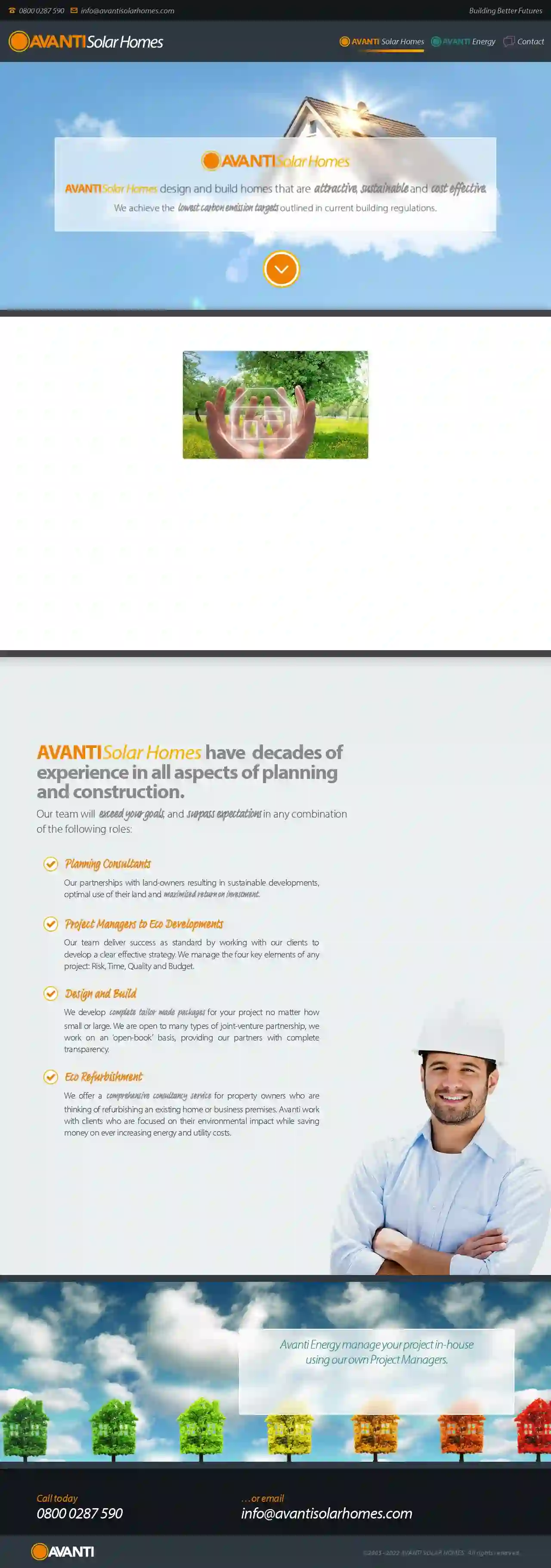
Avanti Solar Homes Ltd
Nottingham, GBBuilding Better Futures Avanti Solar Homes Avanti Energy Avanti Solar Homes design and build homes that are attractive, sustainable and cost effective. We achieve the lowest carbon emission targets outlined in current building regulations. AvantiSolar Homes are the experts in building beautiful homes which achieve zero carbon emissions. Our comprehensive service protects the environment, while always achieving the highest construction standards. With a focus firmly on quality, sustainable construction we also ensure maximum return for your investment. AvantiSolar Homes have decades of experience in all aspects of planning and construction. Our team will exceed your goals, and surpass expectations in any combination of the following roles: Planning Consultants Project Managers to Eco Developments Design and Build Eco Refurbishment Our partnerships with land-owners resulting in sustainable developments, optimal use of their land and maximised return on investment. Our team deliver success as standard by working with our clients to develop a clear effective strategy. We manage the four key elements of any project: Risk, Time, Quality and Budget. We develop complete tailor made packages for your project no matter how small or large. We are open to many types of joint-venture partnership, we work on an ‘open-book’ basis, providing our partners with complete transparency. We offer a comprehensive consultancy service for property owners who are thinking of refurbishing an existing home or business premises. Avanti work with clients who are focused on their environmental impact while saving money on ever increasing energy and utility costs. Avanti Energy manage your project in-house using our own Project Managers. Discover AVANTIENERGY Call today 0800 0287 590 or email [email protected] ©2005 - 2022 AVANTI SOLAR HOMES. All rights reserved.
- Services
- Why Us?
- Gallery
Get Quote
Geo Green Power - Solar Panels Installers
421 reviewsNottingham, GBGeo Green Power is one of the UK’s leading solar panel installers, with over 14 years of experience installing solar panels and renewable energy systems across a range of properties and organisations. Our team of experienced solar PV installers are fully trained to deliver everything from small domestic installations to large-scale commercial roof projects and ground mount systems. From your initial enquiry right through to the completion of your project, we’re dedicated to delivering the best experience possible and a solar installation that we are proud of.
- Services
- Why Us?
- Accreditations
- Gallery
Get Quote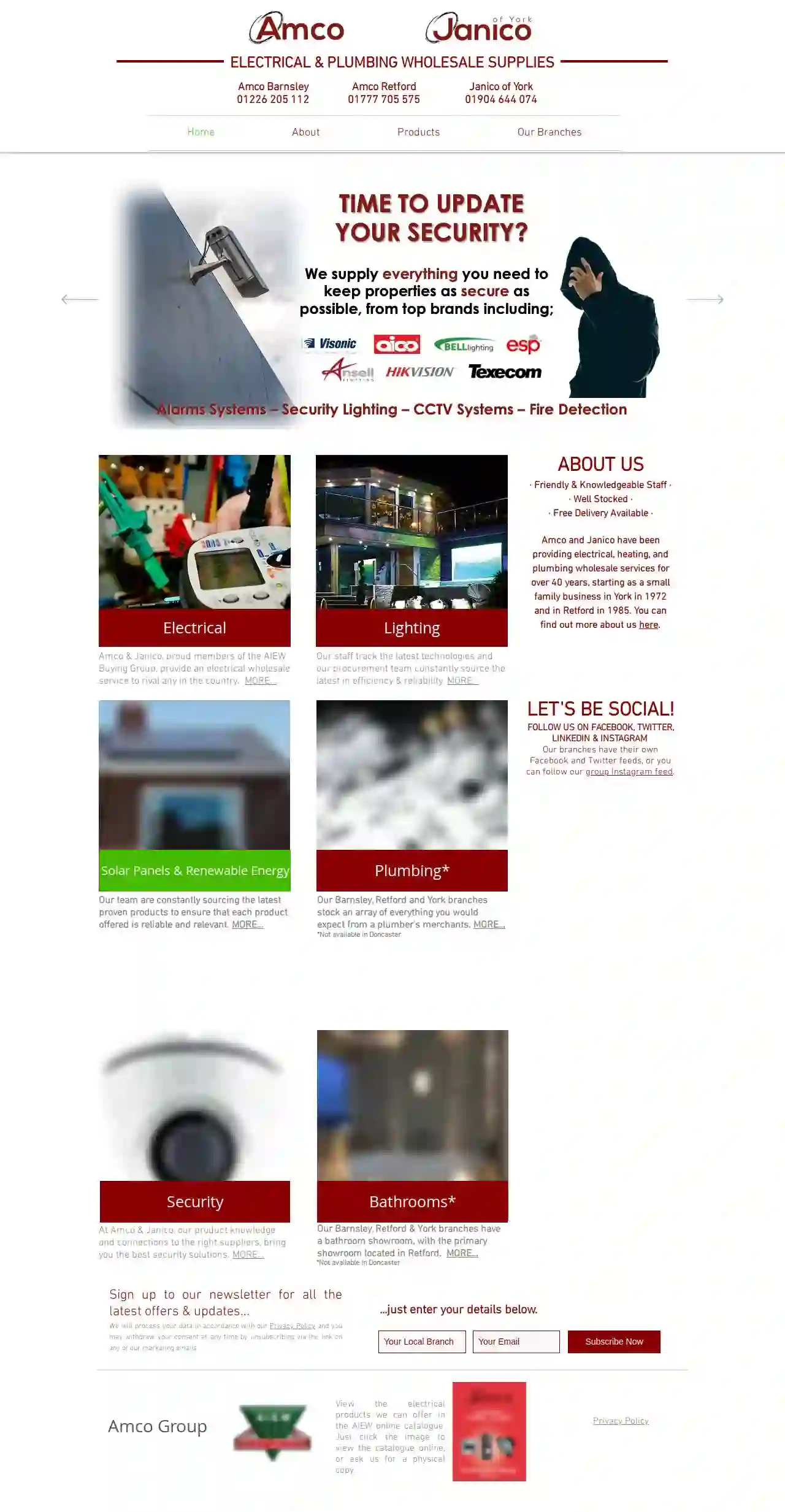
Amco Renewables
53 reviewsBarnsley, GBAmco and Janico have been providing electrical, heating, and plumbing wholesale services for over 40 years, starting as a small family business in York in 1972 and in Retford in 1985. You can find out more about us here. At Amco & Janico, our product knowledge and connections to the right suppliers, bring you the best security solutions. Our Barnsley, Retford & York branches have a bathroom showroom, with the primary showroom located in Retford. We are proud members of the AIEW Buying Group.
- Services
- Why Us?
- Gallery
Get Quote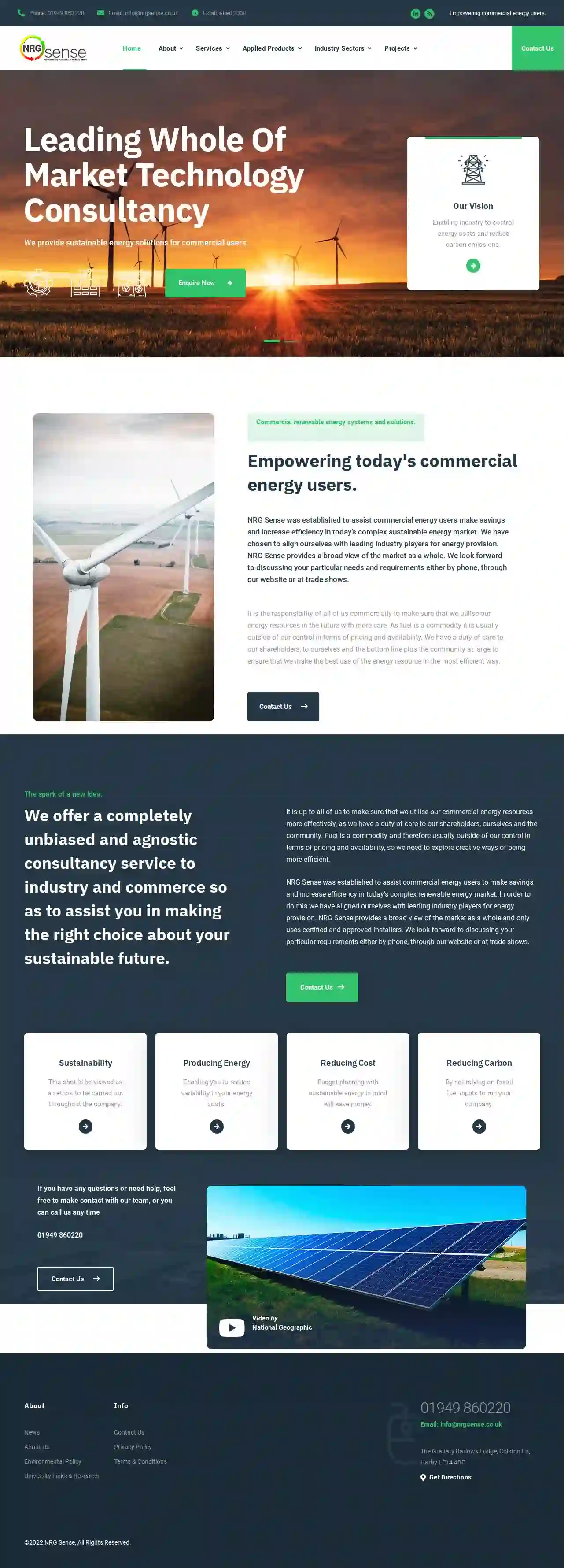
NRG Sense
The Granary Barlows Lodge, Colston Ln, Harby, LE14 4BE, GBNRG Sense was established to assist commercial energy users make savings and increase efficiency in today’s complex sustainable energy market. We have chosen to align ourselves with leading industry players for energy provision. NRG Sense provides a broad view of the market as a whole. We look forward to discussing your particular needs and requirements either by phone, through our website or at trade shows. It is the responsibility of all of us commercially to make sure that we utilise our energy resources in the future with more care. As fuel is a commodity it is usually outside of our control in terms of pricing and availability. We have a duty of care to our shareholders, to ourselves and the bottom line plus the community at large to ensure that we make the best use of the energy resource in the most efficient way.
- Services
- Why Us?
- Gallery
Get Quote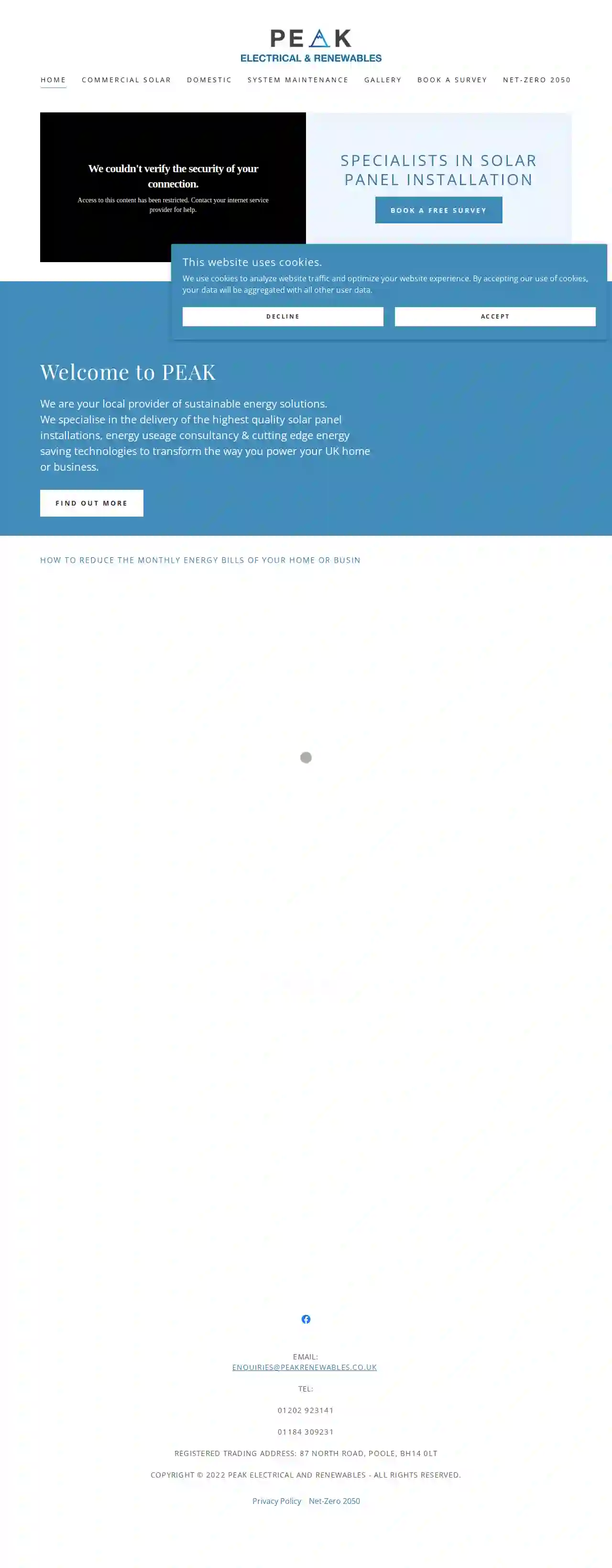
Peak Electrical & Renewables - Solar Panel installation, cleaning and maintenance in Dorset, Berkshire and the South
519 reviews87 North Road, Poole, BH14 0LT, GBYour local Solar Panel installation specialists book a free survey Solar Panel Installations By PEAKWe are your local provider of sustainable energy solutions. We specialise in the delivery of the highest quality solar panel installations, energy useage consultancy & cutting edge energy saving technologies to transform the way you power your UK home, business or school.Find out more how to reduce the monthly energy bills of your home or business. Testimonials
- Services
- Why Us?
- Gallery
Get Quote
Danvers Stanley Electrical Ltd
51 reviewsStanley, GBAt Danvers Stanley Electrical Ltd we have over 30 years of experience in all aspects of renewable and electrical work. Solar Panels With the cost of living continuing to rise, more and more people are looking for ways to save on their energy bills. Solar panels are an excellent way of doing that. We can advise on the specific return on investment that you could see at your property. About solar panels Residential & Commercial We work both in individual homes and commercial premises, advising on what renewable energy solutions are the best fit for your property. With our experienced team we have the capability to deliver large scale installations. As the leading solar experts in Dorset, we are dedicated to increasing the sustainability of your home or business and reducing your carbon footprint. Meet the team With over 30 years combined experience our team really know their stuff. We are NICEIC approved contractors and MCS accredited electricians, specialising in solar instalations. About Us Speak with the experts If you would like to find out about how solar panels could generate electricity at your home or business, we’d love to speak with you. Get in touch Dorset's #1 for Solar Solar Panels We install state-of-the-art solar panels and inverters to guarantee optimal performance and efficiency. About Solar Electrical Services We offer general electrical services to homes and businesses across Dorset. Find out more About Us A skilled team, passionate about rolling out renewable energy, for a more sustainable future. More About Us Solar Panel Installers in Dorset Experience significant reductions in your energy bills while increasing the value of your property. Our solar solutions are not only environmentally friendly but also economically savvy, providing a solid return on your investment. We can crunch the numbers and provide a no-obligation quote and details about your anticipated return on investment. We installing solar and renewable energy solutions near you: Wimborne | Poole | Bournemouth | Ferndown | Corfe Mullen | Blandford | Wareham | Dorset Maintenance & Repairs The service we offer goes far beyond the initial installation of your solar system. We pride ourselves on offering exceptional customer service, and will be there to support you whenever needed. All of our installations come with an an insurance backed guarantee, for complete piece of mind. As well as routine maintenance we offer 24/7 emergency call-outs. To get the ball rolling with your new sustainable energy system, please get in touch.
- Services
- Why Us?
- Accreditations
- Testimonials
- Gallery
Get Quote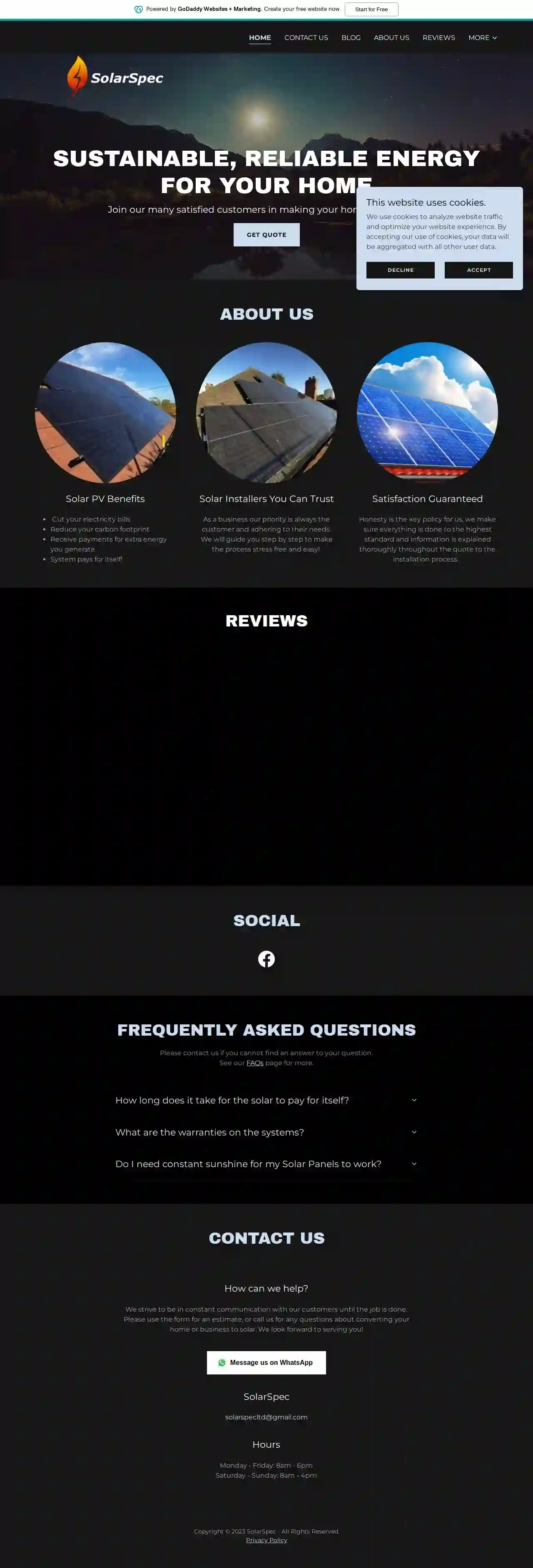
SolarSpec
The Business Centre, 1000 Stratford Road, Unit 10, Birmingham, B12 9AA, GBAt SolarSpec, we are passionate about harnessing the power of the sun to create a sustainable and clean energy future. We are a leading solar PV company dedicated to providing innovative solar solutions for residential and commercial customers in the UK. Our mission is to empower individuals, businesses, and communities to transition to renewable energy by delivering high-quality solar PV systems and exceptional customer service. We aim to make the adoption of solar energy accessible, affordable, and seamless, while reducing our carbon footprint and promoting environmental sustainability. Why Choose Us? * **Expertise and Experience:** With years of experience in the solar industry, our team of knowledgeable professionals brings expertise and a deep understanding of solar PV systems. We stay up-to-date with the latest industry trends and technological advancements to offer you the best solutions tailored to your specific needs. * **Quality and Reliability:** We are committed to delivering the highest standards of quality and reliability in every aspect of our work. We source top-tier solar panels and components from trusted manufacturers, ensuring optimal performance, durability, and long-term value for our customers. * **Customized Solutions:** We understand that every home and business is unique. Our team takes the time to assess your energy needs, site characteristics, and budget to design a customized solar PV system that maximizes energy generation and cost savings. * **Seamless Installation:** Our certified and experienced installation team follows industry best practices and adheres to strict safety standards to ensure a seamless and efficient installation process. We handle all aspects, from permits to grid connections, so you can sit back and enjoy the benefits of solar energy hassle-free. * **Customer Satisfaction:** Your satisfaction is our priority. We are dedicated to providing exceptional customer service and ongoing support. From initial consultation to post-installation maintenance, our team is here to answer your questions, address concerns, and ensure your solar PV system operates at its best. * **Financial Benefits:** We help you navigate the financial aspects of going solar. Our team can assist you in exploring available incentives, rebates, and financing options to make your solar investment as cost-effective as possible. Join the Solar Revolution Today! Make a positive impact on the environment and take control of your energy future with SolarSpec. Let us help you harness the power of the sun to create a brighter, more sustainable tomorrow.
- Services
- Why Us?
- Accreditations
- Our Team
- Testimonials
- Gallery
Get Quote
Mack Solar
53 reviews55 Wollaton Rd, Bradway, Sheffield, S17 4LF, GBSOLAR PANELS SHEFFIELD Commercial Solar Domestic Solar Request a call back Please enable JavaScript in your browser to complete this form. Name * Phone number Send Why MACK SOLAR for Solar Panels Sheffield? Embarking on the journey of installing solar panels in Sheffield can feel like navigating through a maze of unfamiliar information. It’s a crucial decision, and choosing a reliable installer makes all the difference. At MACK SOLAR, we understand the challenges, and that’s why we stand out. As a local, reputable business with over two decades of experience in construction, we bring a level of trust and reliability that newer, “specialist” solar companies often struggle to match. Some of these companies, established to ride the solar panel boom, fold when demand wanes, leaving customers stranded without warranties. With MACK SOLAR, you’re not just getting solar panels; you’re investing in a legacy of reliability and expertise that has been our hallmark for over 20 years. Your solar journey begins with a name you can trust. Eurener Nexa 500W TOPCon Our Eurener Nexa 500W TOPCon panel is a high output and high efficiency Bi-Facial Solar Panel. The efficiency is 23.1%. The manufacturer uses a highly developed fabrication process, including camera verification of welding, to ensure the high quality and consistency of the panels they produce. Bifacial cell – Extra energy generated from the backside of the solar cells reflected from the roof Module efficiency up to 23.10 % 30 year Product warranty Low degradation rate providing 88% of power output after 30 years Award winning Master Builders - We know how to keep your roof Watertight Master Builder Award 2023 Robin Atherton Director Dedicated to Sustainable Solutions At MACK SOLAR, sustainability isn’t just a buzzword – it’s a guiding principle woven into every aspect of our work. We understand the importance of making environmentally conscious choices, and our commitment to solar energy reflects that ethos. By choosing MACK SOLAR for your solar panel needs, you’re not just investing in cutting-edge technology; you’re contributing to a greener Sheffield. Our installations prioritise efficiency and durability, ensuring that your solar panels don’t just meet today’s standards but continue to power homes and businesses for years to come. Tailored Solar Energy Solutions for Homes in Sheffield Sheffield is more than just a city; it’s a community, and we understand that each property has its unique energy needs. That’s why we don’t believe in a one-size-fits-all solution. Our dedicated teams take the time to understand your specific requirements, from energy consumption patterns to architectural nuances. This personalised approach ensures that the solar panels we recommend and install are perfectly suited to your property. Whether you reside in the heart of the city or on the outskirts, MACK SOLAR is your local partner in shaping a sustainable future for Sheffield, one tailored solar solution at a time.To find out how we can help, contact Mack Solar today. 15+ Years In Business 100+ Happy Clients 300+ Projects Completed £100k+ Money Saved Our Services We Provide a Superior Solar Panel Instalation Services Commercial Solar View our solutions for commercial solar panels and learn about how we can help you Commercial solar Solar Repair We don't just install, we repair too. Count on our seasoned team to keep your solar panel system running smoothly. Solar Repair Domestic Solar With 10 years of solar panel expertise, you can trust us to do a professional job from start to finish. Domestic Solar We Install Top Tier Solar Panels, Inverters & Mounting Systems At Mack Solar, we're committed to excellence. We exclusively install top-tier solar panels in Sheffield and around the South Yorkshire Area, including those from industry leaders. Our rigorous selection ensures your investment in solar energy is backed by quality and reliability. Explore our wide range of sola
- Services
- Why Us?
- Gallery
Get Quote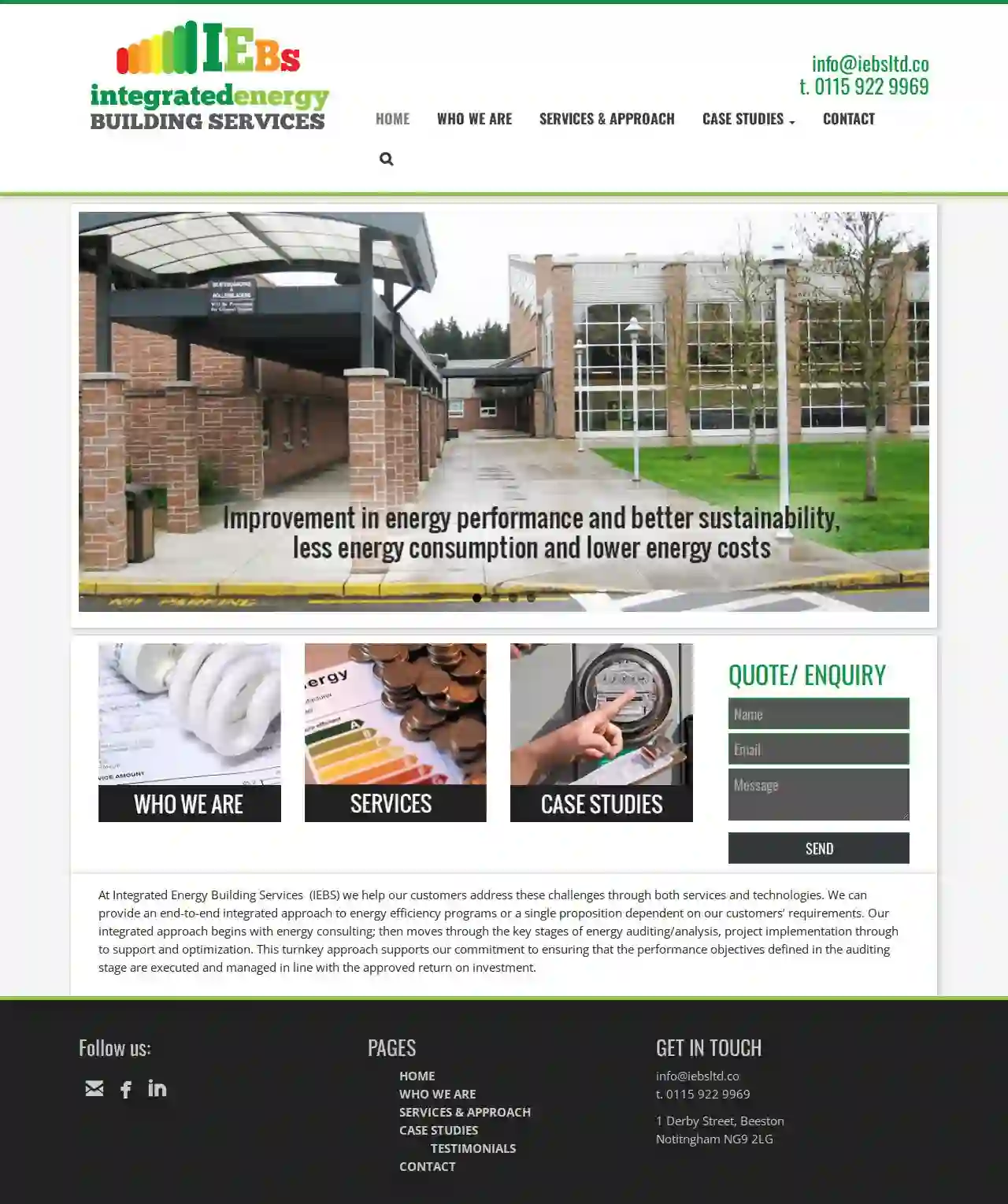
Integrated Energy Building Services
Beeston, 1 Derby Street, Nottingham, NG9 2LG, GBAt Integrated Energy Building Services (IEBS) we help our customers address energy efficiency challenges through both services and technologies. We provide an end-to-end integrated approach to energy efficiency programs or a single proposition dependent on our customers' requirements. Our integrated approach begins with energy consulting; then moves through the key stages of energy auditing/analysis, project implementation through to support and optimization. This turnkey approach supports our commitment to ensuring that the performance objectives defined in the auditing stage are executed and managed in line with the approved return on investment.
- Services
- Why Us?
- Testimonials
- Gallery
Get Quote
GB Solar Ltd
559 reviewsUnit 6 Coach Crescent, Shireoaks Network Centre, Worksop, S81 8AD, GBGB Solar is a company that specializes in the installation of domestic and commercial solar panels, including retrofit storage batteries. They serve customers in Yorkshire and the East Midlands, covering areas like Sheffield, Leeds, Nottingham, and surrounding regions. GB Solar prides itself on providing exceptional workmanship and customer care, aiming to help customers save money and reduce their carbon footprint. They emphasize their commitment to customer satisfaction, highlighting positive feedback and five-star reviews on Google.
- Services
- Why Us?
- Gallery
Get Quote
Over 3,485+ Solar Contractors onboarded
Our solar pros operate in Dinnington and beyond!
SolarCompaniesHub has curated and vetted Top Solar Companies near Dinnington. Find the most trustworthy pro today.
Frequently Asked Questions About Solar Installers
- Adequate Sunlight: Unobstructed sunlight for a significant portion of the day.
- Sufficient Space: Enough space to accommodate the desired number of panels.
- Structural Integrity: A strong roof structure capable of supporting the weight of the panels.
- Appropriate Orientation and Tilt: Ideally, the roof should face south (in the Northern Hemisphere) or north (in the Southern Hemisphere) with a tilt angle close to the latitude of your location. However, other orientations and tilts can still be effective.
- Tax Credits: Reduce your income tax liability based on the cost of your solar system.
- Rebates: Direct cash payments or discounts on the purchase of a solar energy system.
- Net Metering: Allows you to sell excess solar electricity back to the grid for credits.
- Renewable Energy Certificates (RECs): Tradeable credits representing the environmental attributes of your solar energy generation.
- Monocrystalline: Made from a single silicon crystal, known for high efficiency (typically 18-22%) and sleek black appearance.
- Polycrystalline: Made from multiple silicon crystals, slightly less efficient (15-17%) but often more affordable than monocrystalline.
- Thin-film: Made from thin layers of photovoltaic material, lower efficiency (8-12%) but can be flexible and lightweight.
What happens if my roof needs to be replaced after I install solar panels?
How do I know if my roof is suitable for solar panels?
Are there any financial incentives for going solar?
What are the different types of solar panels?
What happens if my roof needs to be replaced after I install solar panels?
How do I know if my roof is suitable for solar panels?
- Adequate Sunlight: Unobstructed sunlight for a significant portion of the day.
- Sufficient Space: Enough space to accommodate the desired number of panels.
- Structural Integrity: A strong roof structure capable of supporting the weight of the panels.
- Appropriate Orientation and Tilt: Ideally, the roof should face south (in the Northern Hemisphere) or north (in the Southern Hemisphere) with a tilt angle close to the latitude of your location. However, other orientations and tilts can still be effective.
Are there any financial incentives for going solar?
- Tax Credits: Reduce your income tax liability based on the cost of your solar system.
- Rebates: Direct cash payments or discounts on the purchase of a solar energy system.
- Net Metering: Allows you to sell excess solar electricity back to the grid for credits.
- Renewable Energy Certificates (RECs): Tradeable credits representing the environmental attributes of your solar energy generation.
What are the different types of solar panels?
- Monocrystalline: Made from a single silicon crystal, known for high efficiency (typically 18-22%) and sleek black appearance.
- Polycrystalline: Made from multiple silicon crystals, slightly less efficient (15-17%) but often more affordable than monocrystalline.
- Thin-film: Made from thin layers of photovoltaic material, lower efficiency (8-12%) but can be flexible and lightweight.